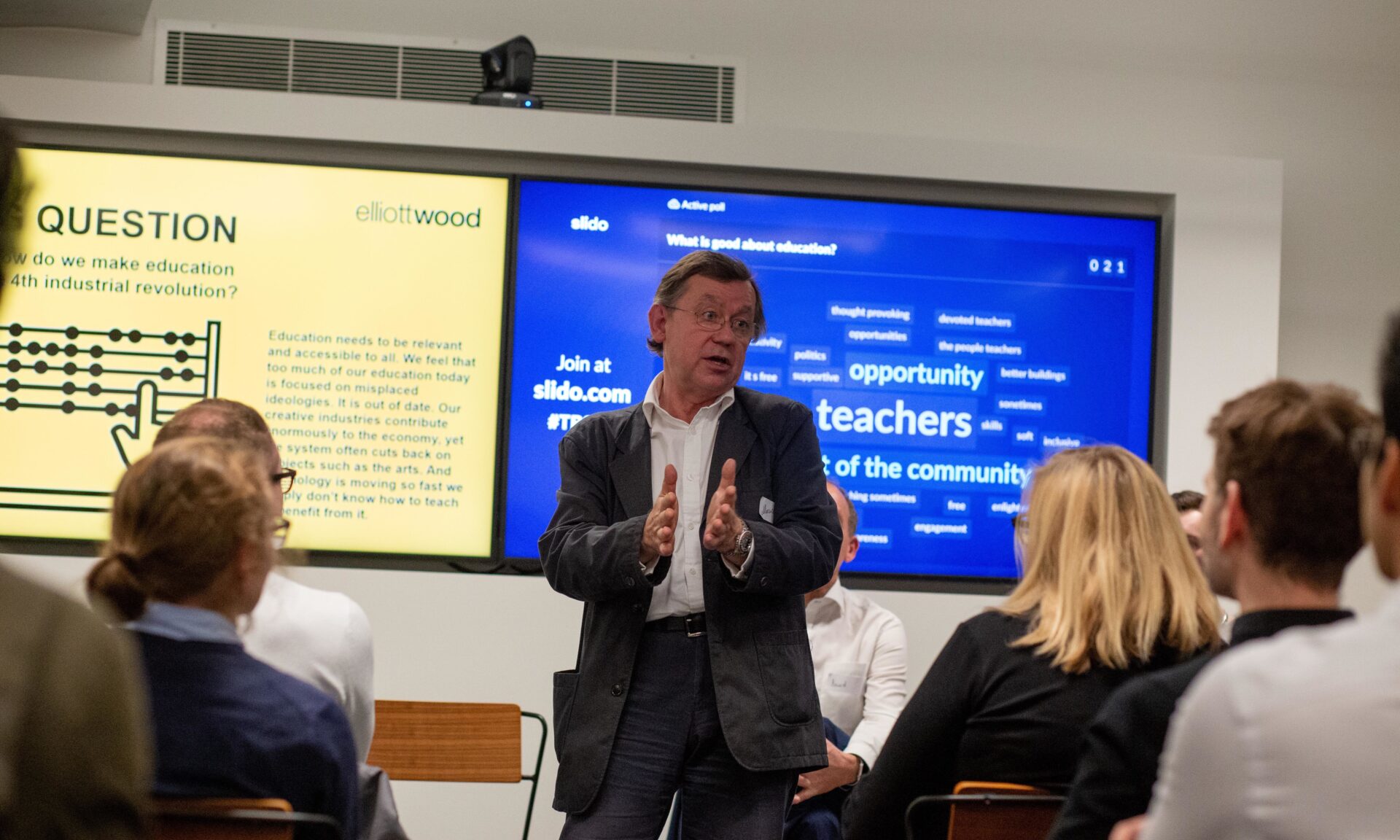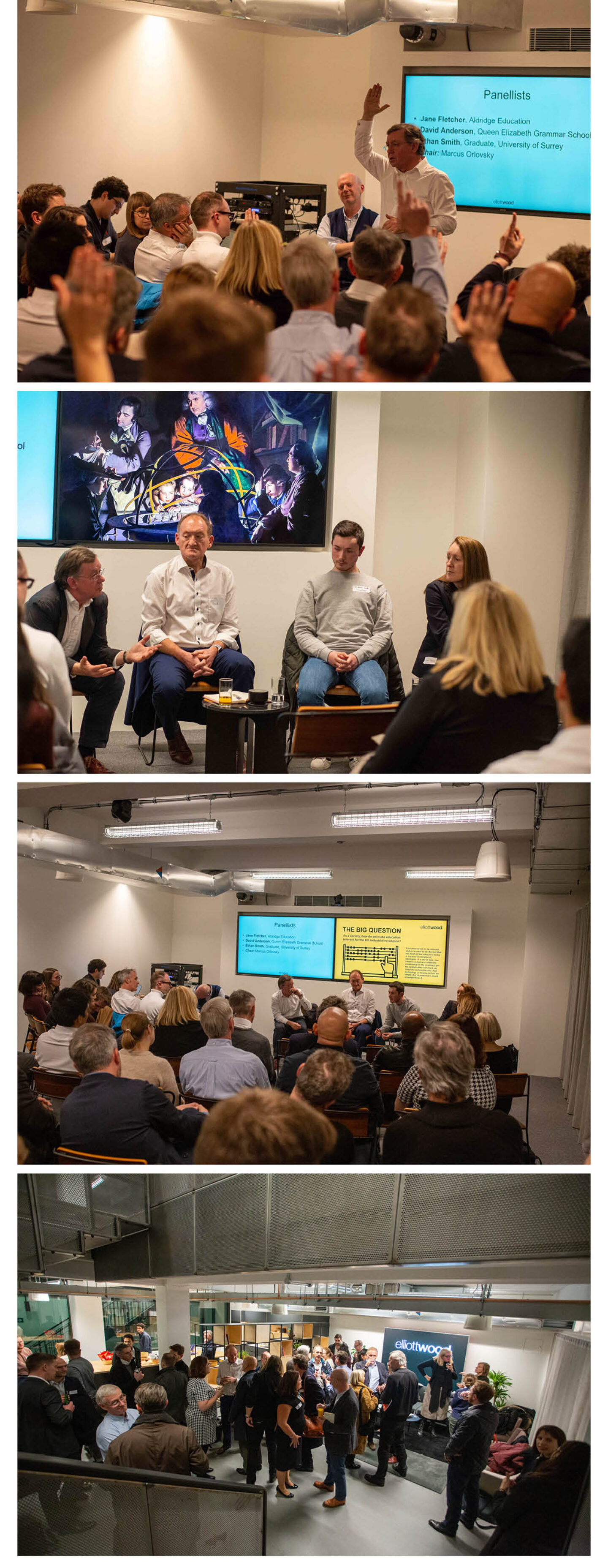Skilled and Ready – Latest


Flexible buildings are necessary to make education relevant for all
Standardisation is one of the biggest problems facing schools in the UK, according to a panel of experts. But if built environment professionals can find a way around it, they can help reboot the education system.
Elliott Wood hosted the discussion at The Building Society, to identify issues in the current school system and explore practical solutions that could be offered by the construction industry.
The panel, chaired by education innovator Marcus Orlovsky, said that a school system based on cookie-cutter designs and box-ticking was something they were all battling against. This setup often fails students who don’t fit the traditional education models, they explained.
“The most important thing for me is inclusion,” stated Jane Fletcher, chief executive of school trust Aldridge Education. “It’s ensuring that what we're offering enables everyone to be able to engage, and accepting that people learn in different ways.”
Standardisation fails students
Ethan Smith understands what’s it’s like to struggle with inflexible learning spaces. After being taken into foster care and diagnosed with Asperger's, a form of autism, he fell behind and feared he wouldn’t pass his GCSEs. But after being moved to an autism-friendly environment and offered one-to-one mentoring, he was able to turn things around.
Smith, 22, now has a degree in political science and advises schools on how to better support children with emotional behaviour disorders.
“The standardisation of education that we currently see in today's society completely failed me,” he said. “If it wasn't for the support of my foster carers and some really good social workers, I probably would have left school with no GCSEs and gone down the wrong path in life.”
Smith’s advice to anyone planning and building schools is to engage with students directly to find out what things they struggle with. For instance, he points out that people with Autism can struggle in enclosed spaces.
Make schools “worthy of excellent behaviour”
Working closely with students and getting them on board is also something Fletcher believes is key when it comes to transforming an education facility that is underperforming into one that exceeds expectations.
Fletcher has a proven track record for turning schools around, both at a local and regional level. In her role at Aldridge Education, she is responsible for overseeing nine schools, including Kensington Aldridge Academy, the school that was previously situated at the base of Grenfell Tower.
She claims that simple changes in an environment help pupils feel valued, which can in turn change attitudes. She also recommends finding out from students what their interests are, however diverse, and allocating spaces that encourage them to thrive.
“The school might be appalling, but you sell the message to your children that you're great and one of the best ways to do that is give them an environment that is worthy of excellent behaviour,” she said. “You give young people the right environment and all of a sudden you'll find that they step up, the whole thing comes together, and you get to see change in the way that the school is.”
Bridge the gap to industry
For new school buildings, flexible spaces offer even more opportunities for improving the quality of education. If facilities are good enough to be used by professionals, there is a chance to further engage students to find out about new and unconventional career paths.
David Anderson, headteacher of Queen Elizabeth's Grammar School in Faversham, learnt this when planning a new theatre facility. The school did all of its own fundraising for the soon-to-complete building, while Anderson – who trained as an engineer – has acted as project manager for the build, giving him complete freedom over the design brief.
This allowed him to insist on spaces of a high enough standard that industry might want to use them. “What we've done from the outset is think about the flexibility of those spaces, creating a professional environment that actually people from outside wants to come into and operate within,” he said.
Fletcher found the same at UTC@MediaCityUK, which is one of Aldridge’s schools. She explains that, because the BBC uses one of its studios, students learn what it’s like to work in creative digital media.
“We need more facilities that allow young people to explore their knowledge by applying it,” she said. “It's what helps our young people to bridge the gap to industry.”
Learn by teaching
The panel also called for architects and other built environment professionals to pay closer attention to operational issues in schools, so that problems aren’t repeated elsewhere. Noisy automated windows can cause distractions in a quiet classroom, for instance, but seem to be a recurring feature.
Post-occupancy evaluations can be useful, but only if you do more than just scratch the surface, explained panel chair Marcus Orlovsky. “If you designed a Tesco and did the post-occupancy evaluation like that, you'd be kicked out,” he said. “You can’t just see what the temperature is, you have to go into fruit and veg, and see how's it selling.”
Orlovsky is founder of Bryanston Square, a social enterprise that champions innovation in the education system. With the belief that standardisation breeds mediocrity, he works with schools to create buildings that are suited to both their settings and the types of learning that they facilitate.
Orlovsky encourages architects, engineers and anyone involved in school design to try teaching a class. “Just pick up the phone, go and have a look, and run a lesson,” he added. “Because often it's only running a lesson that tells you what's going on.”
Make a stand against standardisation
Education sits at the head of Elliot Wood’s ETHICS manifesto, a platform for addressing the big issues facing society today. To make education relevant for the fourth industrial revolution, it calls for curriculums that are broad and adaptable, and buildings that stimulate intrigue and curiosity.
To conclude the panel, Elliott Wood director Andy Downey challenged built environment professionals to move against the mass standardisation in education.
“Standardisation of education fails people and standardisation of the buildings does the same,” he said. “I think standardisation is something that we can all, individually and collectively, make a big stand against.”